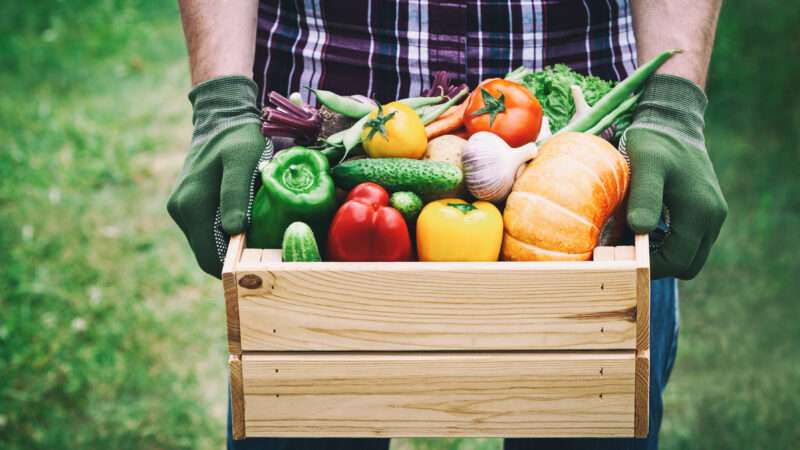
Amended U.S. Department of Agriculture rules announced last month suggest the agency has high hopes for plans to crack down on fraud in the organic food sector.
"The amendments protect integrity in the organic supply chain and build consumer and industry trust in the USDA organic label by strengthening organic control systems, improving farm to market traceability, and providing robust enforcement of the USDA organic regulations," the agency explained in a January 19 notice in the Federal Register. The new final rule, dubbed Strengthening Organic Enforcement, is set to take effect next month (with enforcement delayed until next year).
Some are hailing the USDA's stance.
"The Organic Trade Association, which lobbied for rule, said it represents the biggest change to organic regulations since the creation of the USDA organic food program," the Associated Press reports. "OTA officials said in a statement the regulation 'will do much to deter and detect organic fraud and protect organic integrity throughout the supply chain.'"
Organic food is a big business in this country, and the organic label helps to fetch a premium price.
"To consumers, the symbol means an assurance that an agricultural product such as beef or celery has been produced using only naturally occurring fertilizers, pesticides, and other inputs," I explain in my book Biting the Hands that Feed Us: How Fewer, Smarter Laws Would Make Our Food System More Sustainable. "To producers, the USDA organic seal means higher costs, but also the opportunity to charge consumers more for that beef or celery."
Because of that price premium—and the fact that organic food may be indistinguishable from conventionally raised versions of those same foods—fraud in the organic food sector isn't hard to find. For example, a 2018 case saw two South Dakota grain farmers sent to federal prison for defrauding buyers to the tune of more than $70 million. Two years ago, the New Yorker detailed a scheme involving tens of millions of dollars in fraudulent organic grain sales. Just last month, the Justice Department charged a Minnesota farmer with fraudulent grain sales of nearly $50 million.
So would greater USDA oversight of organic food solve those problems? Call me skeptical.
The amended rules have some producers and sellers concerned they will increase costs for them and consumers. That'll mean higher prices, and higher prices likely mean more incentives to cheat.
A more glaring problem is this: the USDA has been aware for many years that its oversight of organic food has been a massive failure—but that knowledge hasn't spurred the agency to act. For example, a 2010 report by the USDA Office of Inspector General found the agency's "enforcement of federal laws governing organics is abysmal," Food Safety News reported at the time. A subsequent USDA OIG report in 2017—this one focusing on organic-food imports—found (per Buzzfeed) that "consumers who make a point of buying organic food may be getting ripped off" due to lax USDA oversight and other problems.
As I've explained, when it comes to these and other problems plaguing organic food, the USDA is much more a cause than the solution. That's why having the agency become more involved in organics will likely only exacerbate that problem.
It didn't have to be this way. Hippies, homesteaders, and other counterculture types helped to popularize organic foods and farming in this country decades ago. As a result of their efforts, organic food certifiers and labels sprouted up in this country and existed for decades before Congress muscled its way into the sector.
"Organic certification programs began in the early 1970s, when small producers using natural and sustainable farming methods in states such as Oregon and California banded together to establish minimum standards for themselves and their peers," I explain in Biting the Hands that Feed Us. "Certifiers and the small farmers worked with states to pass laws supporting the standards."
Fraud was a problem even in those days. In fact, fraud in the sector was why Congress handed oversight of the industry's labeling and marketing to the USDA.
"Accusations of fraud surrounding organic foods led Congress to scrutinize the certification process," I explain in Biting the Hands that Feed Us, noting Congress passed an organic-labeling law in 1990 that didn't come into force until more than a decade later. "But if the USDA's involvement in organic certification was intended to prevent fraud, its success has been a mixed bag."
For example, as I note in the book, citing numerous reports, "the agency has used its congressional mandate to water down the meaning of the term 'organic' to the benefit of large agricultural producers." I also detail how the Cornucopia Institute, a group that's "one of the nation's strongest supporters of organic farming," is also "one of the leading critics of USDA organic standards."
I often buy organic food. And I hate when businesses defraud consumers. Under the USDA's watch, fraud in the organic food industry has spread. I have little faith that an agency first charged with preventing fraud in the organic food sector is finally getting around to solving that problem 33 years later.
As I've proposed before, a better plan than allowing the USDA more power over organics would have Congress rescind the agency's oversight over organic foods entirely. With that change, the private, state-based bodies (such as CCOF and Oregon Tilth) that have been responsible for certifying producers as organic since the 1970s would continue to verify a producer's organic status. States could also then hand oversight to such certifiers or to state, regional, or even national bodies, which could work with certifiers to ensure compliance with certifiers' rules and to punish bad actors.
The post The USDA Can't Stop Organic Food Fraud appeared first on Reason.com.







